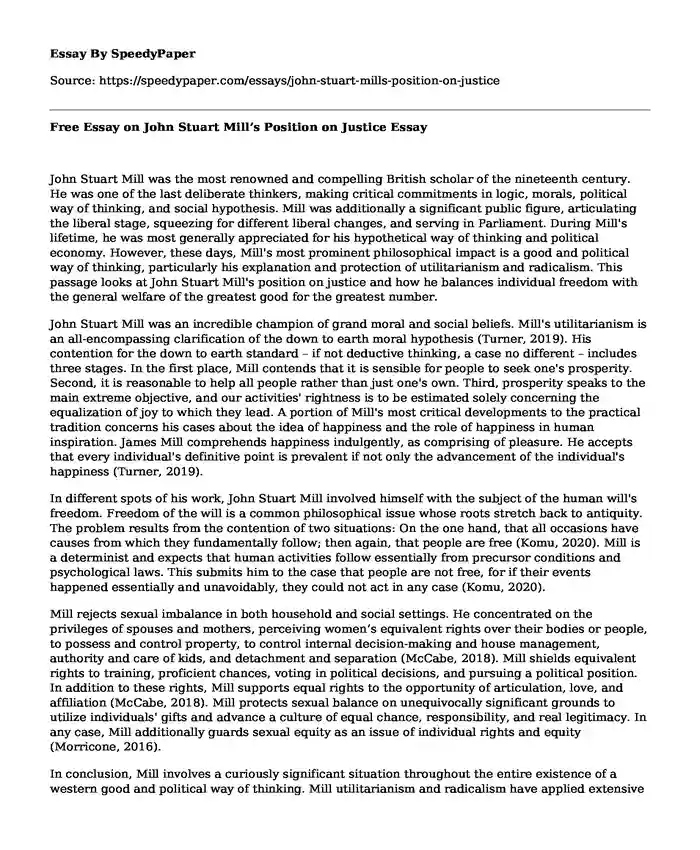
| Type of paper: | Essay |
| Categories: | Justice Philosophers Historical & political figures |
| Pages: | 3 |
| Wordcount: | 696 words |
John Stuart Mill was the most renowned and compelling British scholar of the nineteenth century. He was one of the last deliberate thinkers, making critical commitments in logic, morals, political way of thinking, and social hypothesis. Mill was additionally a significant public figure, articulating the liberal stage, squeezing for different liberal changes, and serving in Parliament. During Mill's lifetime, he was most generally appreciated for his hypothetical way of thinking and political economy. However, these days, Mill's most prominent philosophical impact is a good and political way of thinking, particularly his explanation and protection of utilitarianism and radicalism. This passage looks at John Stuart Mill's position on justice and how he balances individual freedom with the general welfare of the greatest good for the greatest number.
John Stuart Mill was an incredible champion of grand moral and social beliefs. Mill's utilitarianism is an all-encompassing clarification of the down to earth moral hypothesis (Turner, 2019). His contention for the down to earth standard – if not deductive thinking, a case no different – includes three stages. In the first place, Mill contends that it is sensible for people to seek one's prosperity. Second, it is reasonable to help all people rather than just one's own. Third, prosperity speaks to the main extreme objective, and our activities' rightness is to be estimated solely concerning the equalization of joy to which they lead. A portion of Mill's most critical developments to the practical tradition concerns his cases about the idea of happiness and the role of happiness in human inspiration. James Mill comprehends happiness indulgently, as comprising of pleasure. He accepts that every individual's definitive point is prevalent if not only the advancement of the individual's happiness (Turner, 2019).
In different spots of his work, John Stuart Mill involved himself with the subject of the human will's freedom. Freedom of the will is a common philosophical issue whose roots stretch back to antiquity. The problem results from the contention of two situations: On the one hand, that all occasions have causes from which they fundamentally follow; then again, that people are free (Komu, 2020). Mill is a determinist and expects that human activities follow essentially from precursor conditions and psychological laws. This submits him to the case that people are not free, for if their events happened essentially and unavoidably, they could not act in any case (Komu, 2020).
Mill rejects sexual imbalance in both household and social settings. He concentrated on the privileges of spouses and mothers, perceiving women’s equivalent rights over their bodies or people, to possess and control property, to control internal decision-making and house management, authority and care of kids, and detachment and separation (McCabe, 2018). Mill shields equivalent rights to training, proficient chances, voting in political decisions, and pursuing a political position. In addition to these rights, Mill supports equal rights to the opportunity of articulation, love, and affiliation (McCabe, 2018). Mill protects sexual balance on unequivocally significant grounds to utilize individuals' gifts and advance a culture of equal chance, responsibility, and real legitimacy. In any case, Mill additionally guards sexual equity as an issue of individual rights and equity (Morricone, 2016).
In conclusion, Mill involves a curiously significant situation throughout the entire existence of a western good and political way of thinking. Mill utilitarianism and radicalism have applied extensive dynamic effect on the extent of moral concern, the structure of public foundations, government duties, and the interests and privileges of the represented. Mill did a lot to explain the legitimization, substance, and ramifications of utilitarian and liberal standards.
References
Komu, S. S. (2020). Pleasure versus virtue ethics in the light of Aristotelians and the utilitarianism of John Stuart Mills and Jeremy Bentham. Al-Milal: Journal of Religion and Thought, 2(1), 37-56.
http://al-milal.org/journal/index.php/almilal/article/view/57McCabe, H. (2018). 'Good housekeeping'? re-assessing John Stuart Mill's position on the gendered division of labor. History of Political Thought, 39(1), 135-155.
https://www.ingentaconnect.com/content/imp/hpt/2018/00000039/00000001/art00007Morricone, C. (2016). Education, democracy, and representation in John Stuart Mill's political philosophy (Doctoral Dissertation, Durham University).
http://etheses.dur.ac.uk/11683/Turner, P. N. (2019). John Stuart Mill on luck and distributive justice.
https://philpapers.org/rec/TURJSM-2
Cite this page
Free Essay on John Stuart Mill's Position on Justice. (2023, Sep 27). Retrieved from https://speedypaper.net/essays/john-stuart-mills-position-on-justice
Request Removal
If you are the original author of this essay and no longer wish to have it published on the SpeedyPaper website, please click below to request its removal:
- College Philosophy Essay Examples
- The Eighteenth Brumaire of Louis Bonaparte - Book Review Essay Example
- Essay Sample on Views of "The Good Life" By Marcus and Confucius
- Essay Sample on Crime and Public Transport
- COVID-19 Vaccination Distribution under the Trump Administration - Essay Sample
- Essay Example: Letter from Birmingham Jail/ 3 Rhetorical Devices Used
- Navigating Ethical Seas: A Philosophical Exploration of the Lifeboat Dilemma through Plato, Meno, and Aristotle
Popular categories




